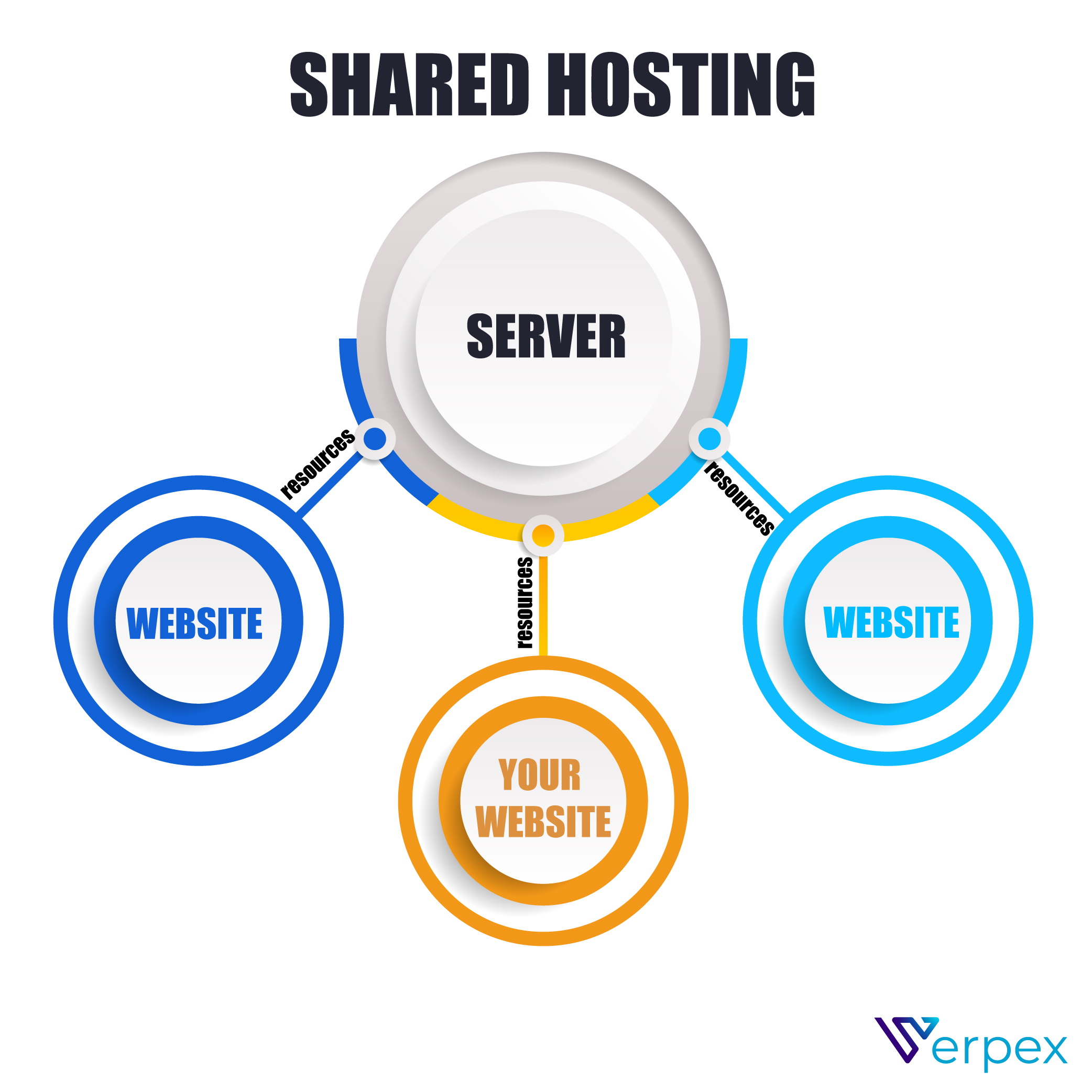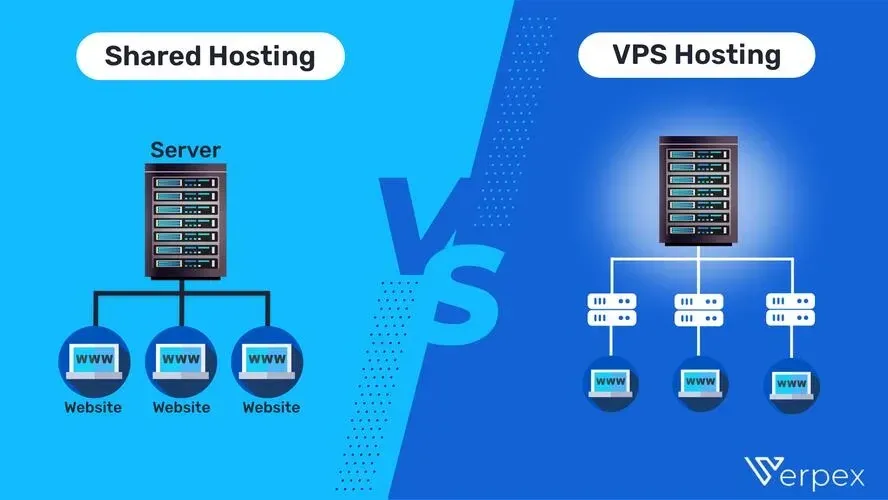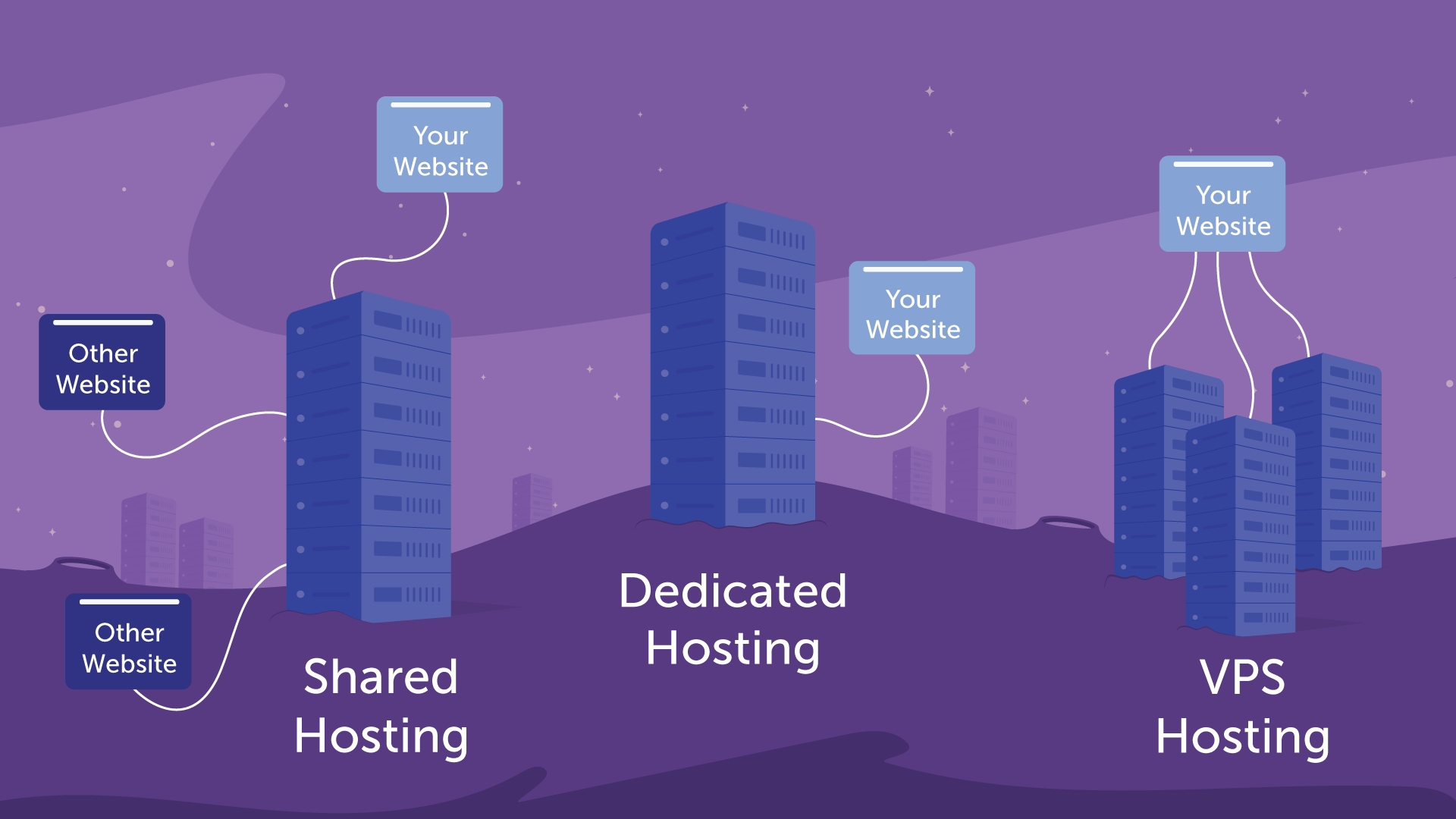Shared hosting is a web hosting service where multiple websites share the same server. It is cost-effective and suitable for small to medium-sized websites.
Shared hosting provides an affordable entry point for individuals and small businesses to establish an online presence. By sharing server resources, users can keep costs low while still benefiting from reliable performance and maintenance services. This type of hosting is ideal for websites with moderate traffic and limited technical requirements.
Users typically receive a control panel to manage their website, making it user-friendly even for those with limited technical expertise. With this type of hosting, you get the essential features needed to maintain a website without the higher costs associated with dedicated servers or VPS hosting.
➡️ What is Shared Hosting?
Shared Hosting is a popular and affordable option for individuals and small businesses to get their websites online. This type of hosting involves multiple websites sharing a single server’s resources, such as disk space, bandwidth, and CPU power. But what exactly is Shared Hosting, and why is it so widely used?
Basic Concept
Shared Hosting operates on the principle of resource sharing. Many websites reside on a single server, pooling resources to reduce costs. This setup provides an economical solution for hosting needs, especially for those with modest traffic and resource demands.
Key points to understand about Shared Hosting:
- Cost-Effective: Shared Hosting is budget-friendly because the costs are split among many users.
- Maintenance: The hosting provider manages server maintenance, updates, and security, allowing users to focus on their websites.
- Ease of Use: Most shared hosting plans come with user-friendly control panels like cPanel or Plesk, simplifying website management.
Here’s a quick comparison table for better understanding:
| Aspect | Shared Hosting |
|---|---|
| Cost | Low |
| Server Resources | Shared |
| Maintenance | Managed by provider |
| Technical Skill Required | Low |
Common Uses
Shared Hosting is versatile and suits various purposes. It’s ideal for:
- Personal Blogs: Perfect for hobbyists and writers who want to share their thoughts online.
- Small Business Websites: Great for businesses needing an online presence without high traffic demands.
- Portfolio Sites: Ideal for artists, photographers, and freelancers showcasing their work.
- Startup Projects: Useful for new ventures to test the waters before scaling up.
For instance, a local bakery can use Shared Hosting to create a website showcasing their products and services. They can add a blog, share recipes, and provide contact information without a hefty price tag. Similarly, a freelance graphic designer can host their portfolio, allowing potential clients to view their work online.
Shared Hosting is also suitable for educational purposes, such as student projects or class websites. Teachers and students can easily create and manage content, making it an accessible option for schools and universities.
Overall, Shared Hosting serves a broad audience, offering an affordable and user-friendly way to get online.
➡️ Benefits of Shared Hosting
Shared Hosting is a popular choice for many website owners. It offers several advantages that make it appealing, especially for beginners and small businesses. The key benefits of Shared Hosting include its cost-effectiveness and easy setup, making it a reliable option for those looking to establish an online presence without breaking the bank.
Cost-effective
One of the most significant benefits of Shared Hosting is its affordability. This type of hosting allows multiple websites to share the same server resources, which significantly reduces costs. Here are some reasons why Shared Hosting is budget-friendly:
- Lower Monthly Fees: Shared Hosting plans are usually cheaper compared to other hosting types like VPS or dedicated servers.
- No Hardware Costs: You don’t need to invest in expensive hardware; the hosting provider takes care of that.
- Maintenance Included: The hosting provider handles server maintenance, saving you time and money.
Consider the following table comparing different hosting types:
| Hosting Type | Average Monthly Cost |
|---|---|
| Shared Hosting | $3 – $10 |
| VPS Hosting | $20 – $80 |
| Dedicated Hosting | $100 – $500 |
As you can see, Shared Hosting is the most economical option. This makes it an excellent choice for startups, bloggers, and small businesses with limited budgets.
Easy Setup
Shared Hosting is known for its user-friendly setup. Even those with minimal technical knowledge can get their website up and running quickly. Here’s why setting up Shared Hosting is a breeze:
- One-Click Installers: Many providers offer one-click installers for popular CMS platforms like WordPress, Joomla, and Drupal.
- Pre-configured Settings: Default server settings are optimized for performance and security, requiring little to no adjustment.
- Control Panels: User-friendly control panels like cPanel or Plesk simplify website management tasks.
Here’s a simple step-by-step process to set up Shared Hosting:
- Choose a Hosting Plan: Select a plan that fits your needs and budget.
- Register a Domain Name: Many providers offer free domain registration with their hosting packages.
- Access the Control Panel: Log in to your control panel to manage your hosting account.
- Install a CMS: Use a one-click installer to set up your preferred content management system.
- Customize Your Site: Add themes, plugins, and content to make your site unique.
With these simple steps, you can quickly launch your website. The ease of setup makes Shared Hosting an ideal solution for beginners and those who need a hassle-free hosting experience.
➡️ Limitations of Shared Hosting
Shared hosting offers a cost-effective solution for small websites and startups. It allows multiple websites to use a single server’s resources. While shared hosting provides affordability, it comes with some limitations. Understanding these limitations is crucial for making an informed decision about your hosting needs.
Resource Sharing
In shared hosting, multiple websites share the same server resources. This means CPU time, memory, and bandwidth are divided among all the websites on that server. This can lead to several issues:
- Limited Bandwidth: High traffic on one site can slow down others.
- Memory Constraints: Intensive applications may not perform well.
- CPU Overload: Heavy usage by one site can affect the server’s performance.
Here’s a table summarizing resource allocation in shared hosting:
| Resource | Impact |
|---|---|
| Bandwidth | Can slow down during high traffic |
| Memory | Limited, affects intensive apps |
| CPU | Overload can slow performance |
Resource sharing can be a major drawback for websites needing consistent performance. Those websites might consider other hosting options.
Performance Issues
Performance issues are common in shared hosting. Websites can experience slower load times and downtime due to shared resources. These issues can affect user experience and search engine rankings.
Several factors contribute to performance issues:
- Traffic Spikes: High traffic to one site affects others.
- Server Maintenance: Regular updates can cause temporary downtime.
- Security Risks: Vulnerabilities in one site can impact all sites on the server.
Here’s a summary of performance issues in shared hosting:
| Issue | Impact |
|---|---|
| Traffic Spikes | Slower load times |
| Server Maintenance | Temporary downtime |
| Security Risks | Potential vulnerabilities |
Performance issues in shared hosting can impact user satisfaction and SEO rankings. Consider these factors when choosing a hosting plan.
➡️ Choosing a Provider
Choosing the right shared hosting provider is crucial for the success of your website. The right provider ensures your site is fast, secure, and always available to visitors. When selecting a provider, consider key features, customer support, and pricing. This blog post will guide you through the essential aspects of choosing a shared hosting provider.
Key Features
When choosing a shared hosting provider, focus on the key features. These features affect your website’s performance and user experience.
- Storage and Bandwidth: Ensure the provider offers ample storage and bandwidth. This keeps your site running smoothly even with high traffic.
- Uptime Guarantee: Look for providers that offer at least 99.9% uptime. This ensures your site is always accessible.
- Speed and Performance: Check if the provider uses SSDs and a CDN. These improve your site’s loading times.
- Security Features: Opt for providers offering SSL certificates, DDoS protection, and regular backups. These features protect your site from threats.
- Scalability: Choose a provider that allows easy upgrades. This is important as your site grows.
Below is a table summarizing these key features:
| Feature | Importance |
|---|---|
| Storage and Bandwidth | High |
| Uptime Guarantee | High |
| Speed and Performance | High |
| Security Features | High |
| Scalability | Medium |
Customer Support
Customer support is crucial when selecting a shared hosting provider. Good support ensures you get help whenever you need it.
Consider these points:
- Availability: Choose a provider with 24/7 support. This is vital if you run into issues at odd hours.
- Support Channels: Look for multiple support channels. This includes live chat, email, and phone support.
- Response Time: Quick response times are essential. You don’t want to wait long for solutions.
- Knowledge Base: A comprehensive knowledge base is a big plus. It helps you find answers quickly without contacting support.
- Customer Reviews: Check reviews to gauge the quality of support. Happy customers often leave positive feedback.
Here’s a table to summarize the customer support aspects:
| Support Aspect | Importance |
|---|---|
| Availability | High |
| Support Channels | High |
| Response Time | High |
| Knowledge Base | Medium |
| Customer Reviews | High |
Choosing a provider with excellent support ensures a smooth experience. Good support can resolve issues quickly, keeping your site running efficiently.
➡️ Setting Up Your Site
Shared hosting is a popular choice for many website owners. It’s budget-friendly and easy to use. Setting up your site on shared hosting involves a few key steps. This guide will walk you through these steps to get your site up and running smoothly.
Domain Registration
Before your website goes live, you need a domain name. This is your website’s address on the internet. Registering a domain is simple. Follow these steps:
- Choose a domain name that is easy to remember and relevant to your content.
- Check the availability of your chosen domain name. Many registrars offer this service.
- Purchase your domain from a trusted registrar. Some popular registrars are GoDaddy, Namecheap, and Bluehost.
Consider the following factors during domain registration:
| Factor | Description |
|---|---|
| Domain Extension | Choose .com, .net, or .org for a professional look. |
| Privacy Protection | Opt for privacy protection to keep your personal details safe. |
| Registration Period | Register your domain for multiple years to avoid renewal hassles. |
Once registered, you will receive a confirmation email. This email contains important details about your new domain. Keep it safe for future reference.
Control Panel Access
After registering your domain, access your hosting control panel. The control panel is your site management hub. Here’s how to get started:
- Log in to your hosting account. You will receive login details from your hosting provider.
- Locate the control panel link. It is often labeled as cPanel, Plesk, or another name.
In the control panel, you can:
- Create email accounts: Set up professional email addresses for your domain.
- Install applications: Use one-click installers to add WordPress, Joomla, or other CMS.
- Manage files: Use the file manager to upload and organize your website files.
- Configure databases: Set up MySQL databases for your site’s data needs.
The control panel also offers security features. Enable SSL certificates to secure your site. Regularly back up your website to prevent data loss.
Spend some time exploring the control panel. Familiarity with its features will help you manage your site more effectively.

Credit: verpex.com
➡️ Managing Your Hosting Account
Shared Hosting is a popular choice for hosting websites. It is cost-effective and easy to manage. Managing your hosting account efficiently ensures your website runs smoothly. This section will cover File Management and Backup Solutions, key aspects of managing your hosting account.
File Management
File management is crucial for keeping your website organized. Proper file management helps in easy access and quick updates. Below are some essential tips:
- Create a Folder Structure: Organize files into folders. Use clear names to avoid confusion.
- Use FTP: File Transfer Protocol (FTP) allows you to upload and download files. Popular FTP clients include FileZilla and Cyberduck.
- Limit File Sizes: Keep files as small as possible. Large files slow down your website.
Here is a simple folder structure example:
| Folder | Content |
|---|---|
| /public_html | Main website files |
| /public_html/images | Images and graphics |
| /public_html/css | Stylesheets |
| /public_html/js | JavaScript files |
Regularly clean up unused files. This keeps your hosting account tidy. Use your hosting control panel to manage files. Most control panels have a file manager tool. This tool allows you to upload, download, and edit files directly.
Backup Solutions
Backing up your website is vital. It protects you from data loss. Here are some backup solutions:
- Automated Backups: Many hosting providers offer automated backups. Check if your provider offers this service.
- Manual Backups: Use the hosting control panel to manually back up your site. Regularly save copies of your files and databases.
- Backup Plugins: Use plugins if you have a CMS like WordPress. Popular plugins include UpdraftPlus and BackupBuddy.
Consider using cloud storage for backups. Services like Google Drive or Dropbox are good options. Here is a comparison table:
| Service | Free Storage | Paid Plans |
|---|---|---|
| Google Drive | 15 GB | Starts at $1.99/month |
| Dropbox | 2 GB | Starts at $9.99/month |
Test your backups regularly. Ensure they restore correctly. This step confirms your data is safe. Always keep multiple copies of your backups. Store them in different locations. This practice adds an extra layer of security.
➡️ Security Considerations
Shared hosting is a popular choice for many website owners due to its affordability and ease of use. However, security considerations are crucial when opting for this type of hosting. Understanding the potential risks and implementing best practices can help protect your website and data.
Shared Risks
Shared hosting means multiple websites reside on a single server. This setup can expose your site to several risks. One compromised website can potentially affect all others on the same server.
Common shared risks include:
- Cross-site contamination: Malware can spread from one site to another.
- Resource hogging: One site using excessive resources can slow down others.
- Security vulnerabilities: Weaknesses in one site can be exploited to attack others.
Imagine a scenario where a neighboring site on the server gets hacked. The hacker could gain access to your site, steal data, or even deface your pages. You rely on the server’s overall security, not just your own site’s defenses.
Shared hosting also involves sharing IP addresses. If one site on the server engages in malicious activities, the entire server’s IP can get blacklisted. This can negatively impact your site’s email deliverability and search engine ranking.
Here is a table summarizing the shared risks:
| Risk | Description |
|---|---|
| Cross-site contamination | Malware spreads from one site to others |
| Resource hogging | One site uses too many server resources |
| Security vulnerabilities | Weaknesses in one site exploited to attack others |
| IP blacklisting | Malicious activities by one site affect all sites |
Best Practices
Following best practices can help mitigate the risks associated with shared hosting. These practices enhance your site’s security and ensure better performance.
Key best practices include:
- Regular updates: Always update your CMS, plugins, and themes.
- Strong passwords: Use complex, unique passwords for all accounts.
- Security plugins: Install security plugins to monitor and protect your site.
- Regular backups: Backup your site frequently to avoid data loss.
- Secure connections: Use SSL certificates to encrypt data transfer.
Consider setting up a web application firewall (WAF) to block malicious traffic. Regularly scan your site for malware and vulnerabilities. Limit the number of installed plugins to reduce potential entry points for hackers.
Choose a hosting provider that offers robust security features, such as:
- Automatic updates
- Regular malware scanning
- Firewall protection
- SSL certificates
By following these practices, you can significantly enhance your site’s security on a shared hosting platform. Always stay vigilant and proactive in managing your website’s security.

Credit: verpex.com
➡️ When To Upgrade
Shared Hosting is a popular choice for beginners and small businesses. It’s cost-effective, easy to manage, and requires minimal technical knowledge. But as your website grows, you may outgrow your shared hosting plan. Understanding when to upgrade is crucial for maintaining performance and ensuring a seamless user experience.
Signs To Look For
Upgrading from shared hosting is necessary when you notice certain signs. Here are some key indicators:
- Frequent Downtime: If your website experiences frequent downtime, it might be due to limited resources on your shared server.
- Slow Loading Times: Increased traffic can cause your website to load slowly, affecting user experience and SEO rankings.
- Resource Limits: Hitting your bandwidth or storage limits frequently is a clear sign that you need more resources.
- Security Concerns: Shared hosting can be less secure, especially if other sites on the same server are compromised.
- Limited Customization: If you require custom configurations or software that shared hosting doesn’t support, upgrading is essential.
To help you understand better, here is a table comparing shared hosting and other types of hosting:
| Feature | Shared Hosting | VPS Hosting | Dedicated Hosting |
|---|---|---|---|
| Cost | Low | Moderate | High |
| Resources | Shared | Dedicated (Virtual) | Fully Dedicated |
| Performance | Limited | High | Highest |
| Security | Basic | Enhanced | Maximum |
Alternative Options
If shared hosting no longer meets your needs, consider these alternatives:
- VPS Hosting: Virtual Private Server (VPS) hosting offers a middle ground. It provides dedicated resources on a virtual server. This option is ideal for websites with moderate traffic and resource needs.
- Dedicated Hosting: With dedicated hosting, you get an entire server to yourself. This option offers maximum performance, security, and customization. It’s perfect for high-traffic websites and large businesses.
- Cloud Hosting: Cloud hosting uses multiple servers to host your website. This ensures high availability and scalability. It’s great for websites with fluctuating traffic and resource demands.
- Managed WordPress Hosting: Specifically designed for WordPress sites, this hosting offers optimized performance, security, and support. Ideal for bloggers and businesses using WordPress.
Here’s a quick comparison of these hosting options:
| Hosting Type | Best For | Key Benefits |
|---|---|---|
| VPS Hosting | Growing Websites | Dedicated Resources, Better Performance |
| Dedicated Hosting | High-Traffic Sites | Maximum Performance, Full Control |
| Cloud Hosting | Scalable Needs | High Availability, Scalability |
| Managed WordPress Hosting | WordPress Sites | Optimized, Secure, Easy Management |
Choosing the right hosting option depends on your website’s needs and future growth plans. Consider these factors carefully to ensure seamless performance and user satisfaction.
➡️ In a nutshell
Shared hosting is a popular choice for many website owners due to its affordability and ease of use. It offers a cost-effective way to get your website online without needing extensive technical knowledge. In this final thought, we will wrap up our discussion on shared hosting and highlight key points to remember.
Key Takeaways
Shared hosting is ideal for beginners and small businesses. Here are some key takeaways:
- Cost-effective: Shared hosting is one of the most affordable hosting options available.
- Ease of use: Most providers offer user-friendly control panels.
- Scalability: Easily upgrade to higher plans as your website grows.
Shared hosting comes with several advantages that make it a popular choice:
| Benefit | Description |
|---|---|
| Low Cost | Shared hosting plans are very affordable compared to other types of hosting. |
| Simple Management | Providers offer intuitive control panels for easy website management. |
| Maintenance | Server maintenance and updates are handled by the hosting provider. |
Limitations To Consider
While shared hosting has many benefits, it also has some limitations:
- Limited Resources: Resources are shared among multiple users, which can affect performance.
- Security Risks: Shared environment can pose security risks if other users are compromised.
- Customization: Limited customization options compared to dedicated hosting.
Is Shared Hosting Right For You?
Consider your website’s needs before choosing shared hosting:
- Traffic: Suitable for websites with low to moderate traffic.
- Budget: Best for those on a tight budget.
- Technical Skills: Ideal for users with limited technical skills.

Credit: www.namecheap.com
➡️ Frequently Asked Questions
- What Is Shared Hosting?
Shared hosting means multiple websites share one server. It’s cost-effective and easy to manage. Ideal for small websites.
- How Does Shared Hosting Work?
In shared hosting, resources are divided among users. Each website gets a portion of server space and bandwidth.
- Is Shared Hosting Secure?
Shared hosting offers basic security. However, vulnerabilities in one site can affect others. Regular updates and strong passwords help.
- Why Choose Shared Hosting?
Shared hosting is affordable and user-friendly. It’s perfect for beginners and small businesses needing less server power.
➡️ Final Thought
Shared hosting offers an affordable and reliable solution for many websites. It’s perfect for beginners and small businesses. By choosing shared hosting, you can save money while still enjoying essential features. Make sure to assess your needs and pick the best hosting plan for your website’s success.




